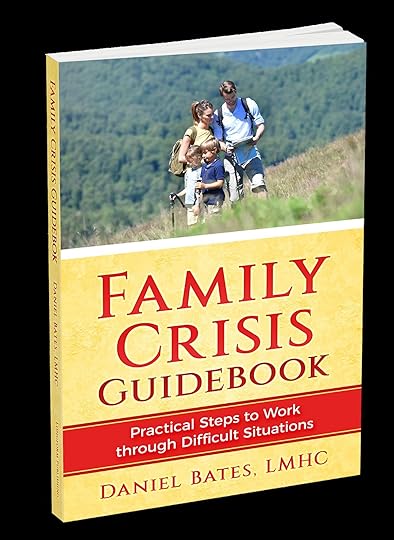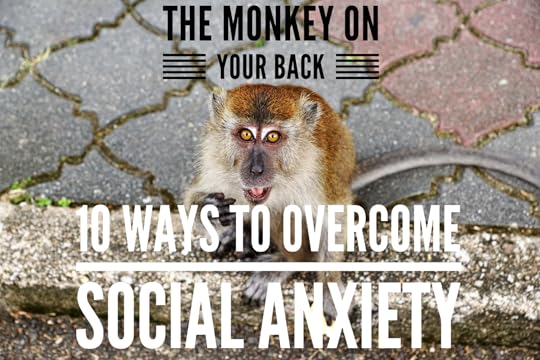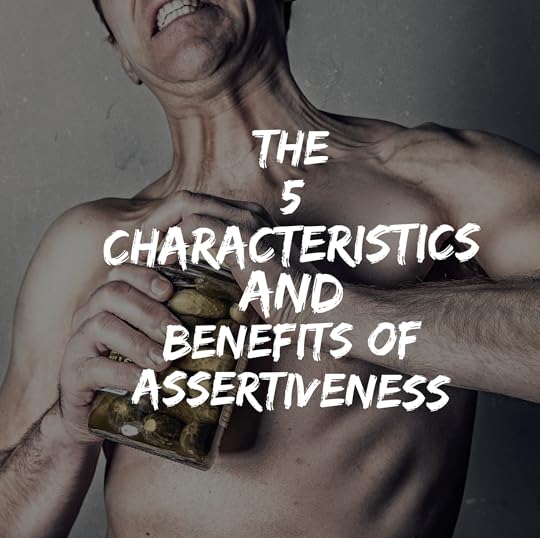Daniel Bates's Blog
February 9, 2019
5 Keys to Happiness
We all want to be happy, but finding “happiness” is, well, kinda hard. The nature of happiness is fleeting, dancing in the periphery. The moment you think you have a firm grasp on it, happiness slips out of your hands. This doesn’t mean happiness is impossible to obtain, but it should open our eyes to the fact that the way we pursue may be problematic. Here are 5, better ways of pursuing happiness that are supported by science:
Pursue Meaning, Not Happiness: Wait! What? I thought this list was about happiness? Why are you telling me to not pursue happiness? You must understand that happiness is paradoxical. In truth, the pursuit of happiness does not ultimately lead to happiness. It will be, at best, temporary. Rather, happiness comes about when an object of greater value than happiness is pursued with pure devotion. Happiness always follows a meaningful pursuit. Yet, once you make it your main pursuit, it will always remain elusive.
Pleasure is Fleeting: So, if pursuing happiness doesn’t ultimately lead to happiness, then what should a person pursue? What about pleasure? Seems like a good candidate for a happiness-inducing pursuit, right? It has been a long-held belief that maximal pleasure and minimal discomfort produces the greatest happiness. From the ancient Greeks to Sigmund Freud, this idea has been with us. And it couldn’t be further from the truth. Pleasure is fleeting. It does not produce long-lasting, life-enriching, satisfaction. Certainly, pleasure feels good, but it is momentary at best in the happiness it brings. What does bring true joy, as I said above, is the pursuit of meaning, purpose and significance. Work through the questions below to explore what your purpose and calling is.
If your not sure what your purpose is, think of what burdens you. What do you see as a problem in the world that needs fixing? Climate change? Bullying? Poverty? Human trafficking?
Consider that your burden may be your calling. If you are open that idea, what strengths and skills do you possess or could possess, that could help solve the problem?
What’s stopping you from throwing your hat into the ring and getting involved?
Sure, you as an individual may not be able to do much, but if you joined an organization? There is power in collective action. You, lending yourself energy and skills to a group, can accomplish much!
Relational Capital is the Greatest Wealth: It’s not true that “He who dies with the most toys wins.” Toys, wealth, possessions, career success, are drops in the bucket compared to meaningful, nurtured relationships. Investments in people yield the greatest return. You will live longer and be happier when you invest in meaningful relationships.
Career Crafting: Pursuing your passion in your career is certainly a valuable thing, but for many, this simply is not a reality. The majority of people do not enjoy their work. They are dissatisfied because they do not feel like what they do matters. And so, they have no drive. But there is a around this problem through the concept called “Career Crafting,” which is the idea that you can infuse a meaningful purpose into your career that transcends the job description. For example, a janitor at an elementary school performs his duties while creating meaningful bonds with the children he works with. He becomes a person the kids enjoy, look up to and care about in an intimidating environment like school. The janitor goes to work with a sense of anticipation not because he gets to clean up vomit and restock toilet paper, but because he’s passionate about investing in children.
Working within Your Strengths: People take great pleasure when they are working at something which involves their strengths and passions. When people work at something from an area of weakness, they may be able to perform, but, overtime, they will be drained and depleted. This is a recipe for burn out. However, working from an area of strength and passion creates vitality and motivation, even when the work is hard and tiring.
Hopefully these five ideas empower your pursuit of happiness. If you enjoyed this blog, please subscribe and follow me on my Facebook business page, Counselor Dan. And be sure to check out my books on available on Amazon.
September 24, 2018
I Really Don’t Know Why I Do Couples Counseling When This Video Exists
Stop trying to fix your partner!
Don’t convince out of a feeling!
Problem solving is only as effective as so far as you can listen and understand your partner!
Lead with listening, follow with solutions if and only if your partner wants solutions!
August 23, 2018
Family Crisis Guidebook Now Available!
 A family crisis is like navigating a treacherous mountain range with no map. For all the effort expended getting back to the path, you manage to find yourself more lost and stuck. Fear leads to desperation, which will only make the crisis worst over time. What if you came across a guidebook for lost travelers trying to find their way back? Family Crisis Guidebook will help you and your family navigate through a relational, addiction and or mental health crisis in ways that will not only help you out of a bad situation, but will help your family achieve sustained change. Change is the only true antidote to future crises. If your family does not take the opportunity for change, the crisis is bound to rear its ugly head, again and again. This book will help you use the crisis for the opportunity it is, a springboard for growth.
A family crisis is like navigating a treacherous mountain range with no map. For all the effort expended getting back to the path, you manage to find yourself more lost and stuck. Fear leads to desperation, which will only make the crisis worst over time. What if you came across a guidebook for lost travelers trying to find their way back? Family Crisis Guidebook will help you and your family navigate through a relational, addiction and or mental health crisis in ways that will not only help you out of a bad situation, but will help your family achieve sustained change. Change is the only true antidote to future crises. If your family does not take the opportunity for change, the crisis is bound to rear its ugly head, again and again. This book will help you use the crisis for the opportunity it is, a springboard for growth.
Family Crisis Guidebook will help you and your family learn how to:
• Properly understand the crisis
• Change dysfunctional patterns of behavior
• Create new and healthy patterns of behavior
• Practical skills for everyone in the family
• Maintain lasting, sustained change that will buffer you from future crises and help your family grow in ways you haven’t imagined.
Crises can be scary and overwhelming, especially when they concern people you love, but denial is not an option. It will only make matters worse. You must engage with the crisis, as a family. And Family Crisis Guidebook can help you do just that by successfully guiding back on the right path.
March 29, 2018
8 Ways to Regulate Your Emotions

Emotions are the drivers for human action. They shape your experience as a human being. They can take you to the heights of pleasure, and to the depths of despair. Life without emotion is unimaginable, but what about life with uncontrolled emotion? Mental health professionals call this emotion dysregulation, which is feeling like your emotions are scattered, in constant flux, outside your control, and unmanageable. This is a difficult place to be, but there is hope. There are skills and ways of thinking that can enable you to regulate your emotions, putting you back in the drivers seat. Below are 8 ways to do this.
Identify What you are Feeling: Recognizing what you are feeling, in the moment, if half the battle. Research shows that identifying/labeling a feeling helps with processing and resolving your emotional state.
Identify Physiological Response: With an emotional response comes a physiological one as well. Both states, physical and emotional, need to be calmed and soothed in order to attain emotional regulation. Additional, the soothing of one helps soothe the other. By doing something that makes you physically feel better will help you also feel emotionally better and vice versa.
Don’t Avoid, Embrace— Mindfulness: Mindfulness is the act of observing your emotions without fighting them. Deep breathing helps put you in a calm state of mind where you can make self-observations of your emotional state. It also helps then describe what you are feeling. Describing is not judging. This is a key difference. By judging what you are feeling, that is a reaction which can exacerbate the emotional intensity. By merely observing, you reduce the emotional intensity.
Calming the Five Senses: Psychologists use a term “The Mind-Body Connection” to describe the intimate connection between the emotional and physical states. One impacts the other. This is not just a point of interest, it also can help with emotionally regulating. When you can do an activity that stimulates one of the five senses: taste, touch, sight, hearing and smell, it helps distract and soothe emotional dysregulation.
Distraction: When Self-Soothing is not effective, sometimes it is effective to distract yourself from the unwanted feeling or thought, and then, at a later time, attempt to address and resolve the issue. Make a list of effective distractions that help take your mind of what you are thinking and feeling.
Opposite Action: A distressing emotion may prompt a person to be self-destructive. Therefore, the idea of opposite action is meant to be a counter to this destructive process by encouraging an individual to do the opposite of what they are feeling. For example, if you see a group of people talking and you assume they are gossiping about you, you could be filled with embarrassment and anger and walk up to them and yell insults at them. This would likely lead to a negative outcome. So, instead of acting on the impulse to yell and attack, you walk up to them and start a conversation and get to know them. If that feels too intimidating, you can walk away or simply ignore them. Any one of these possibilities avoids the negative outcome of acting out one’s anger.
Radical Acceptance: Everything in your life falls into two simple categories: what you can control and what is outside your control. When you try to control the things that are outside your control, you will make yourself crazy. Place what is in your life in its proper category. Put what is outside your control in the “outside my control” category and accept it for what it is. Put what is in your control in the “within my control” category and make constructive steps towards change.
Express and Process Feelings: Expressing and processing your feelings with a trusted confidante helps you find resolution to what you are feeling. Giving voice to unmentionable feelings makes them manageable.
Managing your emotions effectively by using these skills will lead to numerous benefits. You will feel a new sense of self-control and mastery. These are benefits derived from hard work. It isn’t easy creating a new, healthier relationship with your emotions, but the work is worth it. And, so is your overall emotional health.
March 27, 2018
The Monkey On Your Back: 10 Ways to Overcome Social Anxiety

Social anxiety is a lot like a monkey on your back. It’s a constantly distracting and disruptive presence that you can’t see. And it makes the very important things of connecting with others extremely challenging. So, if you like many others, struggle with social anxiety, read this blog. It will help! It you want to get the social anxiety monkey off your back it is imperative that you become aware of what you are feeling, why you are feeling that way, and how that feeling affects your behavior and your thinking. Below are steps how you can manage and even thrive in the face of social anxiety.
Awareness: It is imperative that you become aware of what you are feeling, why you are feeling that way, and what triggers that feeling. What is it about social interaction that causes you anxiety? Are you better in big groups or one-on-one settings? When uncomfortable, how do you react to others? These are good “starter” questions to help you think more deeply about your social anxiety.
Oz Behind the Curtain: Believe it or not, but most other people are probably feeling anxious too. You are not abnormal for feeling anxious. In social situations, many people feel the same way. It is normal to feel uncomfortable in social situations; you are not a freak and you are not alone.
Attention: If others are consumed by their own anxiety just as you are, then their attention is far more absorbed by what they are doing. They are likely not making negative judgements about your attire or behavior. This is should take some weight off your shoulders.
Faux Pas Recovery: Saying the wrong thing, being inarticulate, being a klutz, or acting awkward is not the unforgiveable sin in a social situation. You can recover from a social faux pas. It is your belief that faux pas are unforgiveable that is the problem. People act out faux pas all the time; it’s totally normal. Give yourself some grace, and allow yourself the opportunity to recover from a social misstep. People are far more forgiving than you imagine because we’ve all been there.
Own It: If you are an awkward person who gets anxious in social settings, then own it. Embrace that that’s who you are. Stop running from it. Be your awkward, awesome self!
Habit Building: Anxiety is not a death sentence. Change is possible. Everyday people are able to change emotional and behavioral patterns. There are effective coping strategies and skills to manage anxiety. Your situation is not hopeless, you just need skills.
Don’t Drink That Hater-Ade: If you know someone who is comfortable in social situations, who doesn’t struggle with the anxiety you struggle with, don’t hate them. Be glad for them and then focus on what you need to do in order to improve.
Start Small, Go Big: Challenge yourself to engage with your fears. Pick a small, risky social situation and use the meditation skills to manage the discomfort. Once you overcome your fears at that level of risk, then take on a riskier situation until you’ve become comfortable in most social settings.
Don’t Give Up: Overcoming social discomfort can be hard. It can feel like two steps forward, three steps back. But don’t let this deter you. There’s a process that you must engage with and trust. “Trust the process” as they say. The process of trying new things, stumbling, getting back up and trying again leads to good things.
Celebrate Your Victories: Don’t forget to celebrate your victories. It’s easy to develop a negative perspective. Take the high road, choose to give equal attention to the good and not just the bad. Celebrate your successes, no matter how small.
Overcoming social discomfort can be hard. It can feel like two steps forward, three steps back. But don’t let this deter you, don’t let the monkey on your back win. There’s a process that you must engage with and trust— “trust the process” as they say. The process of trying new things, stumbling, getting back up and trying again leads to good things. And, don’t forget to celebrate your victories. It’s easy to develop a negative perspective. Take the high road, choose to give equal attention to the good and not just the bad. Celebrate your successes, no matter how small.
December 21, 2017
Gifts For Seniors To Help Their Health

Now that the holidays are close, it’s time to hit the mall and do some shopping. No matter what traditions you have in the holiday season, getting presents for your loved ones is almost always one of them.
Kids are easy to buy for. Pick up some games or movies, and you’re done. But what about the seniors in your life? They deserve a good gift as much as anyone, especially since they often have trouble with loneliness and health. In fact, gifts that help seniors improve their health can be just the thing they need. But what kinds of health issues do seniors face?
Gifts To Promote Physical Health
Before you go looking for gifts, it helps to know what health problems seniors typically face. As Everyday Health explains, arthritis is likely the most common ailment — but not the only one. Many seniors have problems with mobility as muscles and joints age. In addition, it can be hard to eat properly when you’re older. That leads to a weaker immune system and more colds.
Then what can you give the seniors in your life? Low-impact exercise is great for seniors, so gifts like exercise peddlers and mini steppers can provide safe activities that improve fitness. Resistance bands are another great idea, but you should also consider a membership to classes specifically for seniors’ health like aqua aerobics or power walking.
You can also purchase a meal delivery service. This isn’t Meals On Wheels, mind you. These days, there are several companies that deliver gourmet meals right to their doorstep. Some are fully cooked, while others include all the ingredients needed to cook a healthy but delicious meal at home.
Don’t Forget About The Mind
Physical health isn’t the only problem seniors can face. The body and mind are interconnected, and many seniors have difficulties with depression and even dementia. That’s why a gift to protect their mental health can be a great idea.
US News & World Report shows that art is often used in therapy and as a creative, fun way to express yourself, which is why a gift of paints or craft supplies can be a great way to help seniors on your gift list. Besides being great fun, art can help prevent cognitive decline that can happen with age.
Games are also a great way to stimulate the brain and fight dementia. Studies show that people who solve puzzles and explore new skills can avoid Alzheimer’s and other issues. While cards and board games are great ideas, look into video games. Not only are these great for mental stimulation, online games can offer a socialization opportunity as you talk about the game.
Playing An Instrument Helps
There is one activity that combines mild exercise with creativity: Playing a musical instrument. Studies have shown that music — especially making it — stimulates the mind and helps keep the brain healthy. Depending on the instrument, it can also offer some activity as you hold and play it.
One of these is the guitar. Equipboard.com lists some of the best online guitar lessons seniors can take. This way, they can enjoy the benefits of a musical instrument while not having to travel.
Improving Health Is A Great Gift
Don’t bother buying something cheesy or silly this year for the seniors on your list. Instead, buy gifts that help seniors improve their health. Get some low-impact exercise equipment, some games, and even some guitar lessons so your older friends can stay healthy and happy for years to come.
Whether your gift improves the mind, body, or both, don’t forget the senior on your list this year. Your gifts don’t have to be expensive to be truly appreciated. Music, arts, food delivery, and exercise equipment will brighten anyone’s Christmas and help them start their New Year off on the right foot, regardless of age.
Author
Teresa is the co-creator of MentalHealthForSeniors.com, which is dedicated to providing seniors with information on physical and mental fitness so that they can be active and happy in their golden years. You can reach her at teresa@mentalhealthforseniors.com.
****This is a guest blog featured on counselordan.com. If you would like to submit a blog to be featured on the website you can contact Dan Bates at dan@lacamascounseling.com for further information.
November 9, 2017
The Gift of Reconciling with Your Recovering Parent this Holiday Season
With the holidays approaching you might be considering building a bridge to your parent. Family relationships can be complicated, and if your senior parent is a recovering addict things can be especially overwhelming. If you aren’t sure where to start, here is some great advice.

Understanding Elderly Addiction
Troubling Statistics- There is growing reason for concern regarding addiction in the elderly, and if your parent is recovering from substance abuse you are not alone. The issue is growing at an alarming rate. U.S. News and World Report explains that between 2006 and 2012 – just a six year span – U.S. emergency rooms saw a seventy-eight percent increase in visits of older adults improperly using substances. Eleven percent of those cases included opiate abuse. Opiates are often prescribed to older adults to control chronic pain, and depending on the medical issue some seniors are able to find physicians who will prescribe all the opiates they request.
Overuse and Overdose- Opiates are particularly addictive. Physical dependence can begin in as little as five days. The longer someone takes the drug, the more it takes to relieve symptoms. NPR advises that the detoxification can take several days, and involves flu-like symptoms such as vomiting and diarrhea. Normally the drugs should be prescribed only for short-term issues, but often elderly patients are prescribed far more than they require. This can mean a medicine chest with unnecessary and addictive drugs.
Complicating matters more, the consequences from these substances can be devastating. Accidentally taking a double dose can mean a fatal overdose. The drugs can cause confusion and contribute to accidents such as falls.
Other drugs and alcohol are also of concern. As bodies age they don’t process substances as well, and symptoms of dependence can mimic symptoms associated with aging.
Rebuilding The Relationship
Change Your Viewpoint– In looking for ways to begin, it can help to understand that many experts feel addiction should be treated as an illness. Our society tends to see addiction as bad behavior and something to be punished. Instead, viewing the problem as an illness can open communication and remove feelings of guilt and shame.
Be humble- According to some professionals, you should go into reconciling with a flexible and forgiving attitude. Anything less will probably yield only misunderstanding and continued conflict.
Communicate- Talking about problems is difficult, but without addressing issues you can’t move past them. Find an appropriate opportunity and set aside time to have that difficult conversation. If discussing things in person is too emotional, a letter might be the right answer. Sitting down with a paper and pen can help you gain perspective and give you an opportunity to find your words. It also gives your parents an opportunity to mull over and savor the letter when it’s received.
Set Boundaries- Some relationships are particularly toxic. The experts at Bustle recommend establishing some boundaries if things are especially troubled. Don’t expect more from your parents than they can give, but don’t allow them to drag you into an unhealthy pattern. Decide that if things get messy you will close conversations to pick them back up another day. Recognize that you cannot make them change, and don’t set unrealistic expectations.
Reach Out- Sometimes family conflicts are deeply rooted and very complicated. If you’re hitting walls and can’t find ways to reconcile, enlist the help of a professional therapist or counselor. Your parents are getting older, and time is precious. Invest in the relationship while you still can.
The Gift of Reconciliation- Reconciling with a parent who is recovering from an addiction can be complicated. Understand the implications of the addiction and reestablish the relationship in a healthy manner. If you find you hit a wall, reach out for help. The holidays are a perfect time to rebuild.
Author
Teresa is the co-creator of MentalHealthForSeniors.com, which is dedicated to providing seniors with information on physical and mental fitness so that they can be active and happy in their golden years. You can reach her at teresa@mentalhealthforseniors.com.
****This is a guest blog featured on counselordan.com. If you would like to submit a blog to be featured on the website you can contact Dan Bates at dan@lacamascounseling.com for further information.
August 21, 2017
10 Things To Do When You’re Depressed

Depression is a challenging, sometimes debilitating mental illness, but there is hope. It’s difficult to pull yourself out of depression, but following these 10 steps might make it a little easier.
This article was originally published on FamilyShare.com, which you can find here.
1. Get some exercise
Research shows that regular exercise or physical activity is an effective anti-depressant. Dr. Michael Craig Miller says, “For some people [exercise] works as well as antidepressants, although exercise alone isn’t enough for someone with severe depression.”
2. Give yourself structure
Keeping a regular schedule promotes a sense of stability, predictability and consistency. Wake up, go to bed, eat your meals and go to work at the same time to start maintaining structure in your life.
3. Break large goals into smaller goals
Depression has a way of making even the simplest tasks seem overwhelming. In order to make a goal more attainable, break it up into smaller goals. For example, going to work in the morning can seem daunting to someone who has depression, so don’t make that your goal.
Instead, set a goal to get in the shower by a certain time. Then make a second goal to brush your teeth. Third, get dressed. These small goals will eventually lead to the bigger goal – getting to work.
4. Maintain a healthy diet
You are what you eat. If you nourish your body, you nourish your mind. Physical health can encourage mental health and vice versa.
5. Keep a journal
It’s important to process your feelings. Don’t feel limited to a journal – anything can work. For some, keeping a journal is an effective way to work through thoughts and feelings. If you don’t feel like you can talk to another person, you can always write about what you’re feeling.
6. Channel your depression
There is a strong connection between depression and creativity. A creative outlet allows you to process your feelings. Sometimes words can’t express what you’re feeling, but a painting, dance routine or sculpture can.
7. Shine a light
The expression “You’re as sick as your secrets” fits well with depression. Depression thrives in the dark. When you isolate yourself from others and keep your depression secret, it’s easier for your depression to thrive. Break the cycle of secrets and be honest about what you are experiencing with others.
8. Find community
It’s hard to overcome depression alone. Reach out to another person for support and help. This may feel uncomfortable, but staying in your comfort zone is part of the problem. Connecting with others might sound scary, but the risk is worth it. Community provides a person with a sense of belonging, practical and emotional support, an outlet for them to vent and opportunities for the individual to support others.
9. Challenge your thinking
Cognitive Behavioral Therapy is a model of therapy that is highly effective in treating Major Depressive Disorder. There are many books, workbooks, articles and programs that are helpful for people with depression.
10. Consider counseling
Talking to a counselor is a great way to cope with depression. Find a counselor you’re comfortable with and trust so you can talk through whatever you need to. They’re there to help you, and they help people overcome depression every day. If you have depression or think you might, it’s never too late to get help. You deserve to be happy, so take these 10 steps and start your better life.
August 17, 2017
The 5 Characteristics and Benefits of Assertiveness

1. Aggressive—Assertive—Passive: People tend to fall on a spectrum of aggressive to passive in their style of communication and how they engage with others. An aggressive person is someone who believes they are entitled to take what they want. They are direct, have little regard for the feelings of others and don’t mind sharing their feelings. They don’t equivocate when addressing a problem or giving feedback. Typically, the aggressive person creates resentment in others. On the other end of the spectrum is the passive person, which is someone who ignores their needs, is indirect, is uncomfortable giving feedback, shies away from addressing problems. This style results in the passive person building resentment towards others since their needs never are met or addressed. Neither the aggressive or passive style promotes healthy relationships. When I work with clients, I recommend the assertive style, which is a person who can be direct and straightforward in addressing problems. They don’t shy away from giving feedback, advocating for their needs. And they do all these things in a manner that is diplomatic and respectful, but doesn’t deny or dismiss truth. The assertive person can communicate wants and desires without attacking others. Assertiveness promotes health in individuals and in relationships.
2. Balance of Needs: Simply because someone has a need different than yours, that does not give you license to dismiss them, nor does it mean you are to dismiss your own needs. It’s okay for people to have different needs. However, it doesn’t mean you are always obligated to meet the demands, needs and wants of others. Sometimes you will need to say no, be flexible, or say yes. But you will make that determination based on fairness, and not from a place that you must always say “yes” to others and “no” to yourself.
3. Deliver Your Message without Attacking: Being assertive means you are able to have difficult conversations, give challenging feedback and address problems, but without attacking others. Speak with respect and empathy, but at the same time do not back off from sharing the truth with others.
4. It’s Not Mean to Be Assertive: There is difference between self-interest and selfishness. Self-interest is a healthy and natural prioritization of your own needs and desires. Selfishness is an exaggerated prioritization of your own needs and desires over and above the needs and desires of others. Selfishness is getting what you want at the cost of others. Assertive people have self-interest. They are able to advocate for their own needs. Be direct with what they want. And enforce boundaries to protect themselves and others. This is not mean or selfish, this is self-interest.
5. Assertiveness is a Preservative for Relationships: Assertiveness is essential in any healthy relationship. It allows partners, friends, family members and co-workers to address issues that lead to resolution. Aggressive communication leads to defensiveness and combativeness. Passive communication doesn’t address problems at all. Assertive communication, on the other hand, provides the means for difficult subjects to be addressed in a meaningful way. Because people the conversation is done with respect, people are more likely to listen, even if they disagree. And you increase the chances that the other person will be more receptive to what you have to say.
August 4, 2017
8 Surprising Dynamics about Personality

Everywhere you look, people are talking about their personality, the personality of others, taking personality quizzes or assessing the personalities of celebrities. We are obsessed with personality in our culture, but how much do those in our culture really know about personality. The following list of 8 Dynamics of Personality may surprise you.
1. Stable: Who you are, in terms of your personality, remains the same over the span of your life. Situations may heighten or suppress an aspect of your personality, but that is only temporary. The core of who you are does not change.
2. The Big 5: There are many personality inventories, assessments and quizzes available online, in magazines or in self-help books, but when social scientists want to study personality, they typically use the Five-Factor theory of personality, or more lovingly referred to as “The Big 5.” The theory states that there are 5 broad personality dimensions or traits, such as: Extraversion, Agreeableness, Conscientiousness, Neuroticism, and Openness. Each trait represents a spectrum. For example, Extraversion has a range of high extraversion— someone who is very sociable, talkative, assertiveness, and expressive— to low extraversion— someone who is more comfortable being alone, exhausted quickly by social contact, avoids small talk, and doesn’t like being the center of attention.
3. Context Driven: The expression of someone’s personality is determined by the context they are in. An extravert at a funeral will likely tamp down their social excitement. An agreeable police officer won’t be so agreeable when apprehending a criminal. Our personality traits are like volume knobs, traits get turned up or down depending on the context.
4. Predictable: We all like to think we are unique, that there’s no one else out there that’s just like us. And the truth is you are and you aren’t. Why? Based on your personality traits, what you would do, your behavior, in a given situation is predictable. In general, extraverted people are expressive, entertaining, and talkative at parties. Certainly, sometimes an extravert will have an off day, maybe they aren’t feeling well, or they lost their job, or a family friend died, but most of the time, an extravert will behave in a predictable way in certain situations.
5. Inherited: Personality traits are largely shaped by the genes inherited from parents. But that is not the only factor that shapes personality. Environment is a major contributing factor to personality development. Environment is composed of many things such as: family, culture, class, era, race, language, beliefs and religion, and physical traits. Genes and environment are two sides of the same coin.
6. The Personality of Others: People tend to be attracted to those who exemplify the same personality traits as themselves. When voting for a political candidate, looking for a mate, making friends, getting to know co-workers, generally people will pursue those who are most like themselves.
7. Disordered: Personality, among other things, can be classified as disordered, meaning an individual’s personality is the cause of impairment or dysfunction in their life. Personality disorders can range from an excessive need for connection with others to no desire to be with other people. Or it can range from extreme emotional states to virtually no emotional states. Personality disorders are extreme examples of personality traits that a culture deems as dysfunctional. Personality disorders often harm the individual and those around them, yet the individual with the personality disorder is unaware of the role their personality plays in the problem.
8. Modifiable: Personality can be changed. It is not easy to do because personality is intrinsic to who we are, but it is possible. To give you an idea of how difficult personality change is, imagine if your spouse, family members or friends sat you down and said that you have a serious problem. And in order to fix the problem you have to change who you are. Not just a troublesome behavior, or bad habit, but the fundamental core of who you are. That might be a difficult message to stomach, right? However, if an individual can be convinced that their personality is contributing to their pain or distress, then they may be open to modifying their personality. How does one do that? Personality change is intensive work, which usually takes years of treatment. Using treatment models like Cognitive Behavior Therapy and Dialectical Behavior Therapy, clients have been able to change emotional and cognitive patterns so that their responses and patterns of behavior are healthier.



